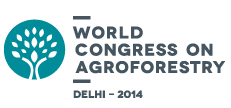Agricultural (in) justices: Investigating feminization of agriculture and its implications to food security in Nepal
Agricultural (in) justices: Investigating feminization of agriculture and its implications to food security in Nepal
wca2014-1945 Sujata Tamang 1,*Krishna P. Paudel 1,Krishna K. Shrestha 2 1ForestAction Nepal, Kathmandu, Nepal, 2University of New South Wales, Sydney, AustraliaThe rural Nepal is going through the rapid socio-economic and environmental change. The influential driver is the remittance economy associated with out-migration of economically active male labor force from rural areas to urban centers and overseas countries to seek employment. This has led an injustice in sharing of agricultural performance, in which rural women are now forced to take up disproportionate responsibilities of agriculture works. This phenomenon can be described as the feminization of Agriculture. This paper aims to investigate the causes and consequences of feminization of agriculture works, created agricultural injustices and its implications to household food security in the middle hills of Nepal.
This study employs both qualitative as well as quantitative approach to data collection in two mid-hill districts of Nepal, using both household survey and key informant interview.
Findings indicate that in the absence of male counterpart, the female members of the households are taking more responsibilities in carrying out agricultural activities within the male dominant agriculture system. This is not only inappropriate but also is very much unfriendly for women to function. In this situation, women are increasingly taking up the strategy of adapting less intensive farming practices as well as abandoning their agriculture lands. As a result, there is reduction in food production at the local level, hence food insecurity.
In conclusion, the study suggests that there is need for revisiting the agro-ecological practices to explore possibilities of reintroducing the low input and less labour intensive agroforesrty practices, which can substantively reduces the workload of women as well as ensures the food security at local level by optimizing the use of local resources more efficiently. However, it is only possible when the policies, institutions and agro-ecological practices are reoriented considering these vital factors.

